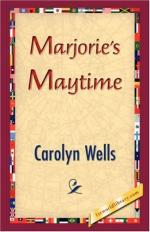“Yes, I could,” said Midget, contentedly, “’cept when I’ve just had enough. And I do feel like eating, but I feel like singing, too.”
“You can’t do both at once,” said her brother.
“No, but I can do first one and then the other. Now I’ll tell you, Father, what to do. You make a little song for us, while I eat this apple. A kind of a little motor song, you know.”
So while Marjorie ate her apple, and the other children engaged in the same pursuit, Mr. Maynard made a little song for them.
This was a favorite game of the Maynards. Father Maynard had a knack of turning off verses, and they usually sang them to some well-known air, or perhaps made up a little crooning tune of their own.
So when the apples were finished and the cores flung away, Mr. Maynard lined out his little song, and the children quickly learned it.
After two or three attempts they were able to sing it correctly, and they stowed it away in their memory as one of their favorite songs, and at intervals throughout the day their young voices filled the air with these sentiments:
“Very happy the Maynards are;
Taking a tour in their motor car
Gaily to Grandma’s lickety-split
Marjorie, Rosamond, Kingdon, and Kit
Mothery, fathery, also along,—
Gaily we sing our motor car song!
Hooray, hooray!
For our holiday
May for the Maynards!
Maynards for May!”
CHAPTER IV
VISITING A CAMP
Rockwell was soon left far behind, and the Maynards’ car flew along the country road, now passing through a bit of woods, and now through a little town, or again crossing a picturesque brook.
The children were delighted with the new experience, and chatted all at once, about the roadside sights.
Pompton, the English chauffeur, though he said little or nothing, was secretly amazed at the gaiety and volubility of the young people. The children were allowed to take turns sitting in the front seat, and, as was their nature, they talked rapidly and steadily to the somewhat taciturn driver.
“What a funny name you have, Pompton,” said Marjorie, as she sat beside him; “at least it seems funny to me, because I never heard it before.”
“It’s a good old English name, Miss,” he returned, a little gruffly, “and never been dishonored, as I know of.”
“Oh, I think it’s a very nice name,” said Marjorie, quickly, for she had had no intention of being unpleasantly critical, “only I think it’s a funny name. You see Pompton sounds so much like pumpkin.”
“Do you think so, Miss?”
“Oh, well, it doesn’t matter about a name, anyway. Tell me about your people. Have you any little boys and girls?”
“No, Miss; I never was married, Miss. And I ain’t overly fond of children.”
“Really, aren’t you, Pompton? Well, you’ll have to begin being fond of them, because you see, us Maynard children just can’t stand anybody around who isn’t fond of us. Though of course we’ve never tried, for everybody who has lived with us has always been terribly fond of us.”




